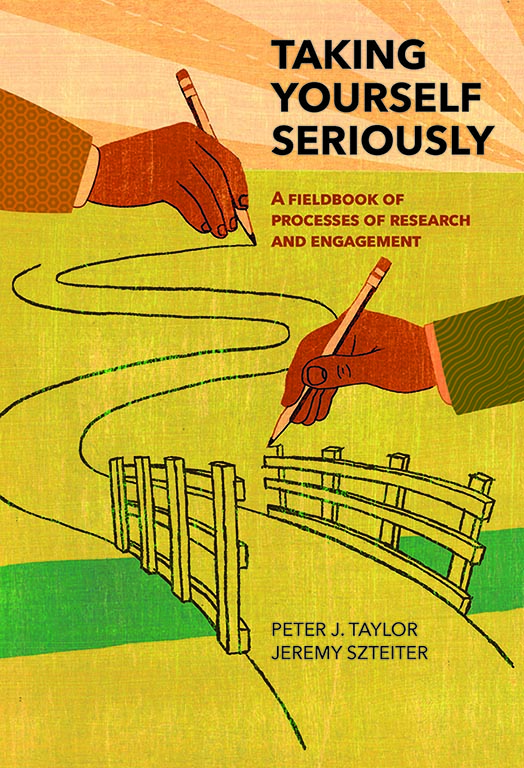A book of tools and processes to help readers in all fields develop as researchers, writers, workshop facilitators, and agents of change

Purchases. More details
Continue reading
Category Archives: academic life
Guidelines to journal reviewers
[Journal X] is different from other journals in that our editorial team puts in a significant amount of effort to improve submitted papers. Our aim as an editorial team is to provide authors with clear guidance to help them revise and improve their submissions. Towards that aim, our editors synthesize and reconcile any substantive differences in the reviews, sometimes adding our own suggestions. Submissions may go through several rounds of revision before acceptance.
In the spirit of assisting authors to develop their thinking and make their written exposition of that thinking work better on readers, we ask you as a reviewer to follow these guidelines: Continue reading
Learning Road Trip
A series of visits to people whose work you want to learn more about or, by their responses to you presenting your own work, learn from. Although, in the academic world, budgets and schedules for hosting visitors are limited, people are often happy to carve out time and arrange an audience for a self-funding visitor, especially one who wants to learn more about their work. You do not have to be on their “A-list” to be welcome. Airbnb or economy motels and driving your own car can keep costs down. To reduce the strain of driving long distances, team up with someone with whom you can have a rolling in-car seminar on what you are learning and other shared interests. Continue reading
Generating a mentoring relationship
Having volunteered to mentor undergraduate students in our Honors College, I now have to learn how to develop mentoring relationships that are helpful. At this stage what is clear is: Continue reading
“Changing Academic Life”: extracts from a nomination statement
[I didn’t receive the award, but it was helpful to assemble what I’ve done in relation to a possible path ahead.]
“Most workshops are dysfunctional—this one wasn’t!” read an evaluation from the first New England Workshop on Science and Social Change (NewSSC), a 4-day workshop I have organized since 2004 around issues ranging from ecological restoration to public involvement in environmental health.[2] “I now know 13 other people I can go to for advice, encouragement, teaching help, ideas, collaboration, anything,” one 2008 participant wrote in her evaluation. Continue reading
Critical and Creative Thinking (CCT) at UMass Boston: Major developments since 2010
Critical thinking and creative thinking are defined or construed in many different ways; there is, moreover, no standard definition of what it means to combine the two pursuits. This has allowed the mission of the Graduate Program in Critical and Creative Thinking (CCT) at UMass Boston to grow and develop over nearly forty years in response to the personal interests and professional needs of the students in the Program and in response to the changing make-up and ongoing personal and professional engagements of the faculty. Historical background for the Program as a whole that conveys the flavor of CCT as an evolving entity is given in the Appendices. What follows are the major developments since the last AQUAD [7-year] review to set the scene for the current review.
Continue reading
The global Paleyian university
For this case borrow the internet further so that offices, classrooms, or the university can be retrofitted. Not rebuilt from scratch, but respecting the infrastructure that is already in place. (source)
Instead of a retrofit, this design sketch promotes inversion or turning inside out or perhaps gastrulation. (In the embryological process of gastrulation the initial ball of cells invaginates so that some of the outside is now inside and that new inside is in interaction with the outside, creating a new interactions.) Unpacking that picture, we have three steps: Continue reading
“At that point, something will crack”: How to disturb Rorty’s prescience?
The pragmatist philosopher, Richard Rorty, appears to be prescient about the 2016 U.S. presidential race in this extract from 1997 lectures. Can we see how to disturb his critique of the “American Left” and the unfolding of the scenario he predicted? Continue reading
Guidelines for personnel procedures giving value to the various dimensions of scholarship of engagement
This post draws attention to the guidelines for personnel procedures of the College of Education and Human Development of the University of Massachusetts Boston. They can serve as a model to be adopted and adapted for a) units that don’t have explicit or detailed guidelines; and b) giving value to the various dimensions of scholarship of engagement. Continue reading
Definitional ceremony
In November 2009, Laura Rancatore and Peter Taylor introduced to the CCT graduate program the narrative therapy and community work of Michael White. This approach helps a person or a group acknowledge multiple past allies, aspirations for their lives, significant discoveries, problem-solving practices, etc. so as to write and realize alternative scripts (or narratives) to the ones that are limiting their lives. A central part of the CCT event was a definitional ceremony, which took something akin to the following form: Continue reading